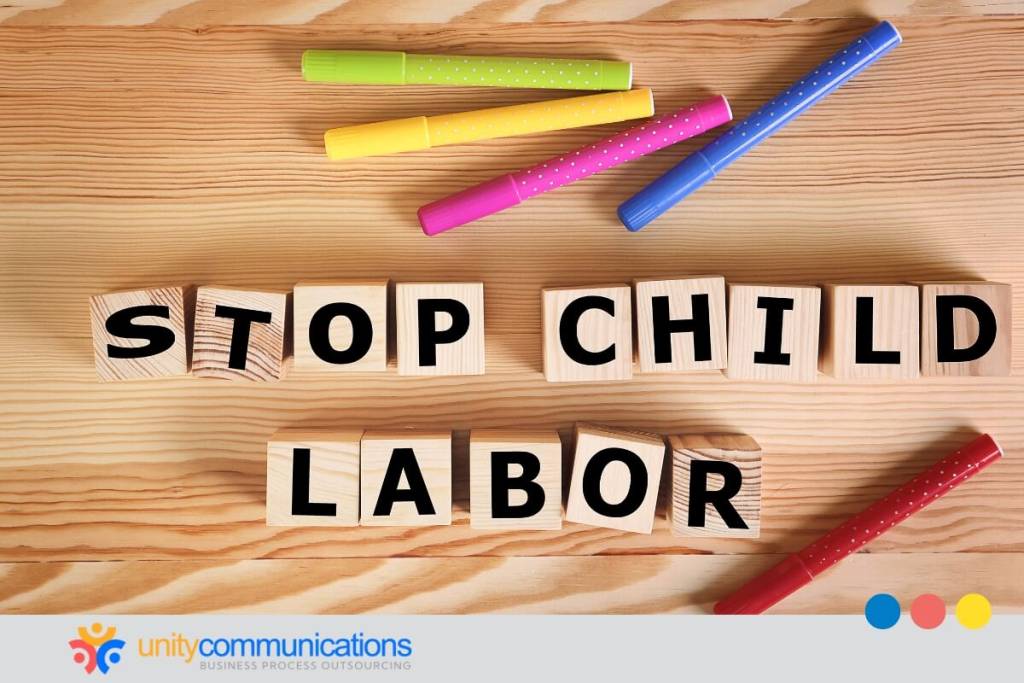IN THIS ARTICLE
Table of Contents
Child labor is among the oldest and most prevalent employment issues. Even with strict regulations, the Department of Labor still discovered approximately 6,000 children working illegally in fiscal year 2023. Workforce shortages and inflation drive these increasing cases.
The business process outsourcing (BPO) industry has thus far no known records of violating child labor laws. First, you have to be 18 years old to enter the field. Second, specialized skills and knowledge are required to handle BPO tasks.
Despite that, service providers still take steps to protect children from illegal working conditions. Browse this article to learn more.
Steps BPO firms take to prevent child labor

The Labor Department recorded 5,792 young people working unlawfully in the fiscal year ending September 30, 2023. This figure shows an 88% increase since 2019. The government unit noted that pandemic-driven labor shortages and inflation have led to an increase in minors seeking employment and companies hiring them.
According to a 2023 New York Times report, children below the legal minimum age work long hours in hazardous supply chain settings across the United States. These dangerous jobs violate both domestic and international child labor laws.
Although the BPO sector is far from hiring kids under the age of 16 or 18, providers execute crucial methods to avoid illegal youth employment. They ensure ethical and legal operations by implementing the following practical measures:
Optimize advanced technologies
Cost reduction influences some companies to hire minors. Increased savings are also a known factor that causes companies to outsource. But instead of exploiting innocent kids, BPO firms let clients achieve that cost-cutting advantage by leveraging artificial intelligence (AI) and automation tools.
For instance, children often work in industries requiring manual labor, such as agriculture and manufacturing. Their responsibilities range from planting and harvesting to product sorting and packaging. These tedious tasks can result in physical injuries, especially when they lack protective gear.
BPO companies specializing in this field avoid infringing on child labor laws by deploying AI-powered systems to automate farming and manufacturing processes. Instead of using human hands, they use machines to speed up crop harvesting and food packing.
Besides eliminating manual labor, providers use AI and BPO tools to perform the following activities:
- Use digital verification tools when performing applicant background checks. This process confirms the age and identity of potential workers, minimizing the risk of hiring underage workers.
- Foster supply chain transparency using blockchain technology. Recording and validating each process on an immutable ledger helps BPO companies ensure their clients, subcontractors, and suppliers comply with ethical labor practices.
- Utilize biometrics to authenticate attendance. Providers use this solution to avoid identity fraud. Although rare, these trackers can help pinpoint underaged individuals using falsified or stolen credentials.
- Maximize mobile apps to report on and monitor employment challenges. These platforms enable workers and employers to address possible concerns related to child labor in real time.
- Launch e-learning initiatives. BPO firms invest in educational tech to host remote training and awareness programs on child labor issues. These programs help reach a broad audience, especially employees and business partners worldwide.
Understand and adhere to BPO-related child labor laws
Studying and complying with federal laws is what BPO companies initially do to address child labor. They familiarize themselves with relevant rules and regulations to ensure the protection of children aged 17 and below.
Although a direct and comprehensive child labor law does not exist for BPO, providers still need to abide by national and international standards. These policies vary depending on where they are. Here are some general principles that tackle child labor and impact outsourcing:
- International Labour Organization (ILO) conventions. ILO Convention No. 138 sets the minimum age for employment, highlighting the need to keep children safe from economic exploitation. Meanwhile, ILO Convention No. 182 sets protocols to eliminate the worst forms of child labor, including hazardous work.
- National labor standards. BPO companies are subject to child labor laws in their countries. These policies define the minimum age for employment, working hours for minors, and other compensation matters.
- Education and work regulations. Some countries implement specific regulations about balancing education and work for kids. These rules outline restrictions on the types of work children can perform and their allowed working hours.
- Workplace safety regulations. Child labor laws include provisions regarding workplace safety and health for minors. Since BPO companies only hire people 18 years of age and older, they still adhere to these rules to establish a secure working environment.
- International business ethics and corporate social responsibility (CSR). Aligning practices with these standards shows the providers’ commitment to ethical employment procedures and child labor restrictions.
Improve human resources (HR) strategies
BPO companies continuously enhance their HR processes and policies to ensure compliance with child labor laws. Besides fulfilling legal requirements and optimizing modern tools, they implement these proactive measures to preserve the rights of kids:
- Execute robust age verification processes during the hiring phase. Providers perform thorough documentation checks to ensure all workers meet the legal working-age requirements.
- Incorporate child labor policies in employee handbooks. Service vendors educate their new employees on child labor guidelines during onboarding and ongoing training. Continuous education reinforces their aim to prevent child labor.
- Conduct regular audits and facility inspections. These efforts include on-site visits, document reviews, and interviews with workers to confirm and update the accuracy of employment information.
- Work with industry associations. BPO companies require their HR managers and employees to actively engage with associations and organizations promoting ethical business practices. This keeps them updated on best practices related to child labor prevention.
The bottom line

Even with stringent rules and regulations to protect kids from forced labor, some industries still find ways to exploit their vulnerabilities. Meanwhile, other sectors strictly adhere to these policies, highlighting the importance of keeping children away from hazardous jobs.
BPO is among the industries that have taken steps to address child labor. Service providers use automation to achieve cost-effective operations and services instead of deploying children to perform manual work. They also study related laws and update their HR strategies to ensure that children are secure.
Let’s connect to exchange more insights about this sensitive but crucial matter. Unity Communications houses a comprehensive knowledge base and experts to help you further understand how a BPO company addresses child labor laws. Its scalable resources can also assist in meeting your urgent operational needs.





